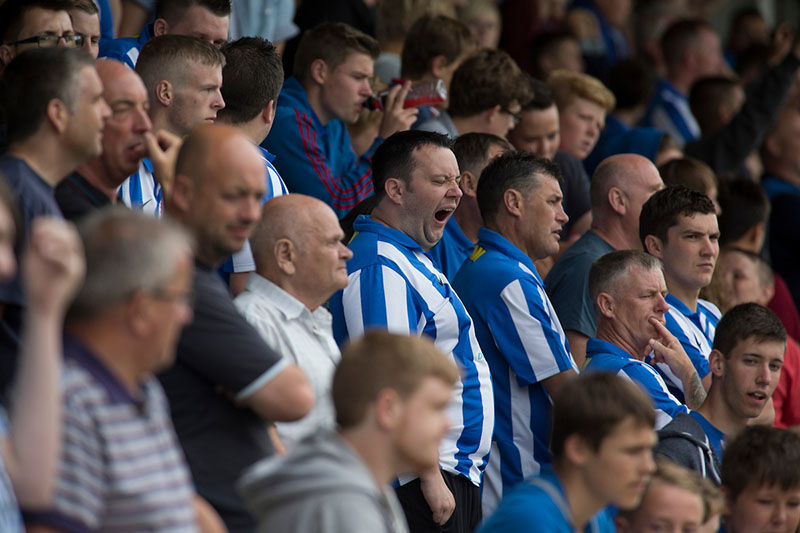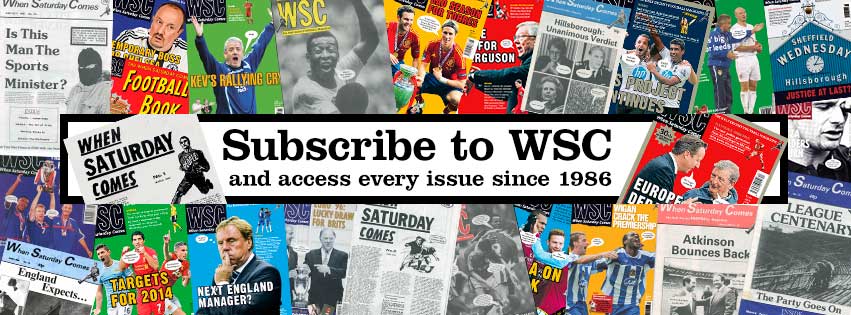
The barrage of instant-reaction anger ignores the central traits of most match-going supporters: cynicism, resignation and a sense of perspective
11 February ~ I couldn’t remember the last time I’d enjoyed watching Hartlepool. I had just seen them perform their latest act of self-destruction, recovering from one goal down to go 2-1 ahead, before losing 3-2 at home to Sutton United in late October. Yet I didn’t feel the usual frustration. Not at the third Sutton goal, the long balls to Luke James against two giant centre-backs, or even the referee, who seemed unaware that long stoppages to reprimand the visitors’ foul play did more to penalise a home side chasing an equaliser.
The apathy that I felt instead was brought to mind when overhearing Radio 5 Live’s 6.06 football phone-in recently. The show’s host, Jason Mohammed, whose role is apparently to orchestrate staged conflict between Robbie Savage and phone-in guests, invited “outraged” Liverpool fans to call in and defend their club – this being against Savage’s suggestion that the then-favourites Manchester City looked more likely to win the Premier League this season.
The invitation to be outraged is in no way surprising in the social media age of journalism, where every complex issue is watered down to a series of polar viewpoints. More telling was Mohammed’s allusion to that ancient fallacy: with all football fans being so inevitably partisan, Liverpool supporters would of course disagree that Manchester City are a better side.
I’m left to wonder if this reflects the courting of a new demographic, the relentlessly defensive Social Media Fan. Their optimism remains untempered by years of wasted time and money, on tickets, travel and organisation, only to be disappointed by a squad of players who seem to care less than they should, or owners who will happily run a club into the ground just to pocket their share of the assets.
Wherever this impression comes from, Mohammed’s summation seemed weakly simplistic. Over two interrupted decades of standing on the Mill House terrace at Victoria Park, my experience is less of an unequivocally partisan following, more an outwardly cynical, yet loyal, majority.
As with any set of supporters there is the usual cross-section of neurotics, ready to hurl abuse at any (often blue-and-white-shirted) target. Yet many more have seen it all before, and are half-watching the game in-between conversations, the recognisable rhythms of a National League fixture forming the backdrop to their Saturday afternoon. Familiar faces leave early so they can enjoy the guaranteed satisfaction of a couple of pints over the less dependable fare of watching Hartlepool. Poor performances can be mourned half-jokingly, because no one is rushing to call up a phone-in and denounce anyone who thinks Pools won’t reach the play-offs this season (even if it is hard to imagine the subject coming up).
None of this is to suggest that what happens on the pitch is irrelevant. When the game builds to a climax, conversation ceases and we all revert to being anxious onlookers. But most of the time (at a club which only recently nearly folded altogether) a sense of perspective is retained. Bar some cathartic message board ranting, most can avoid spending the rest of the weekend dwelling endlessly on the result, the team selection or the manager’s position. The producers’ imagined audience of perpetually argumentative, volatile fans, with a relentless appetite for talking about their team – that barely exists here. In fact, there are plenty who would rather think about anything but Hartlepool United, or might prefer to be, as someone suggested during a particularly grim midweek fixture, “at home watching Escape to the Country”.
Sadly, the everyday fan’s voice is heard less often as broadcasters pander to a more predictable demographic. Those wretched gambling adverts tell us what this is supposed to look like – mostly male, sharing light-hearted but never unsavoury jokes with pals in replica shirts, as immersed in the fortunes of their fantasy football team as the team they support.
That’s not to say these fans aren’t in some way representative. It’s important to embrace the fact that the way people choose to watch football is changing. But targeting a specific audience doesn’t have to mean coldly categorising football fans as an identikit collective. Just because radio phone-ins and social media Q&As are prone to attracting hysterical personalities shouldn’t mean an automatic reversion to pre-scripted headlines, followed by orchestrated conflict to reinforce the stereotype. Why not allow supporters to talk cynically about their own team, as is the case in reality, rather than persist with the weird myth that we are all invariably partisan? There should be more nuance to the never-ending “debate”, or at least some recognition that supporting a football team holds a unique significance to all of us, even those who hurl patio furniture round European market squares while singing moronically about German bombers. Or maybe that is precisely why the editorial line on football is a cautious one.
The fact that Mohammed’s pleas were finally answered by an irate Everton fan probably best sums up the inherent idiosyncrasies of football fandom. For me, the match between Hartlepool and Sutton United was best forgotten. I arrived home at half past five, complained when asked about the score, sat down with a cup of tea and felt an instant and stirring connection with my youth. A quiet reassurance that for me, more than berating a player in pink boots or shouting about the need for video technology, is football’s eternal allure. Tom Acey
Photo by Colin McPherson/WSC Photos: A Hartlepool fan enjoys the match at the Victoria Ground
This article first appeared in WSC 384, March 2019. Subscribers get free access to the complete WSC digital archive – you can find out more here
